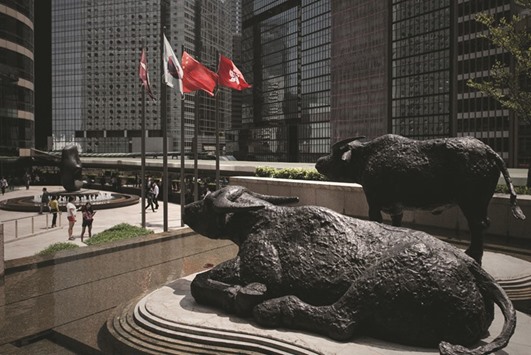For all the gloom enveloping Hong Kong, the stock market is looking decidedly upbeat.
The mainstays of the $291bn economy, from property to tourism, retail sales and trade, are fraying. Public confidence in the city’s future is the lowest in a decade and legislative dysfunction is delaying bills.
The benchmark equity gauge is heading in the opposite direction, back towards a bull market.
Optimists say Hong Kong is home to some of the strongest companies in Asia and a $2tn equity rout has made the city’s shares too cheap to pass up.
Plus, two of the biggest concerns that propelled the MSCI Hong Kong Index to a three-year low in January - the Federal Reserve’s monetary tightening and China’s sliding yuan - have receded, with US policy makers dialling back their planned interest-rate increases for this year and the Chinese currency stabilising against the dollar.
“I can understand from macro viewpoint a number of strategists saying Hong Kong is not looking great,” said Khiem Do, the Hong Kong-based head of multi-asset strategy at Baring Asset Management. “But when you look at the companies, they are very hardnosed, very bottom-line focused.
There will always be some great companies in Hong Kong trading at a reasonable price which one has to buy because they’re very well managed.” The MSCI Hong Kong Index climbed 17% from its January 21 low through Wednesday, beating the 14% advance by the MSCI All-Country World Index. Even after the advance, the city’s 44-member gauge trades at 1.2 times net assets, almost half the level of the global measure.
The MSCI Hong Kong index advanced 1.2% on Thursday, its highest close since November 24, while the Hang Seng Index rallied 1.8%.
While the city’s economic data is poor, that doesn’t mean the outlook for its companies is necessarily bad, according to Adrian Mowat, the chief Asian and emerging-market equity at JPMorgan Chase & Co An improvement in China’s economy will boost equities across the border, he said.
For Mowat, some of the biggest weightings on the MSCI Hong Kong gauge are well diversified with good cash flow, while utility companies are attractive to yield-hungry investors.
Pork producer WH Group, the best performer on the measure this year, gets 60% of its revenue from the US, with about a third coming from China. Analysts forecast an average 4.2% dividend yield in the next 12 months for utilities CLP Holdings and Power Assets Holdings, compared with an average 2.9% for companies on the MSCI Asia Pacific Index.
The time to buy is when sentiment has turned “overly bearish,” says Tony Chu, a Hong Kong-based money manager at RS Investment Management, which oversees about $17bn.
That may explain why stocks most directly tied to Hong Kong’s economic problems have led the rebound. Among the biggest gainers are Macau casino operators, real estate companies including Li Ka-Shing’s Cheung Kong Property Holdings, and lenders such as Bank of East Asia.
The Macau gambling industry is suffering through an almost two-year slump, Hong Kong’s home sales are the lowest since at least 2002 and Morgan Stanley predicts the city’s lenders will struggle under shrinking revenues and rising credit costs.
Chow Tai Fook Jewellery Group is up 32% from its January low, even as reports showed the number of mainland tourists, who once flooded the city’s shopping districts to load up on luxury handbags and expensive watches, fell 18% in the first two months of the year, according to Hong Kong government data. Retail sales plunged the most since 1999 in February and the first-quarter jobless rate reached a 28-month high.
“It’s still a functioning economy,” said Paul Chan, the Hong Kong-based chief investment officer for Asia excluding Japan at Invesco, which oversees $772bn globally. He holds more Hong Kong shares than the benchmarks he tracks. The city’s “corporate ownership is a bit different. They are family owned or majority shareholder owned and the balance sheet risk is a lot lower in terms of capital expenditure.”
For Rahul Chadha, co-chief investment officer at Mirae Asset Global Investments, the dominance of a handful of tycoons over the city’s economy is a reason to sell rather than buy. He says it’s strangling innovation, while the city’s businesses will struggle without being able to rely on a steady increase in mainland tourists.
“It’s a very oligopolistic market structure which doesn’t encourage too much competition,” said Chadha. The stock market is “cheap, but it can go lower. You’re not seeing an improvement from a structural, fundamental perspective for us to say that this is bottoming.”
Chu says the city’s large budget surpluses will help it counter the effects of a slowing economy, while a weakening greenback and diminishing prospects for higher US interest rates will relieve pressure on the Hong Kong dollar. The government is also able to relax some measures it introduced to cool the property market if the downturn continues, Chu says.
Hong Kong sits on estimated fiscal reserves of $111bn. Traders are pricing in zero chance the Fed will raise rates at its meeting next week, while the first month with at least even odds for a boost is December. Secondary residential prices are stabilising after mortgage rates eased since March.
“Although it’s gloomy and the economic outlook is weak, it may not be as bad as people would have expected,” Chu said. “The negatives are moderating now.”

Two bull statues displayed outside the Hong Kong Stock Exchange. For all the gloom enveloping Hong Kong, the stock market is looking decidedly upbeat.
